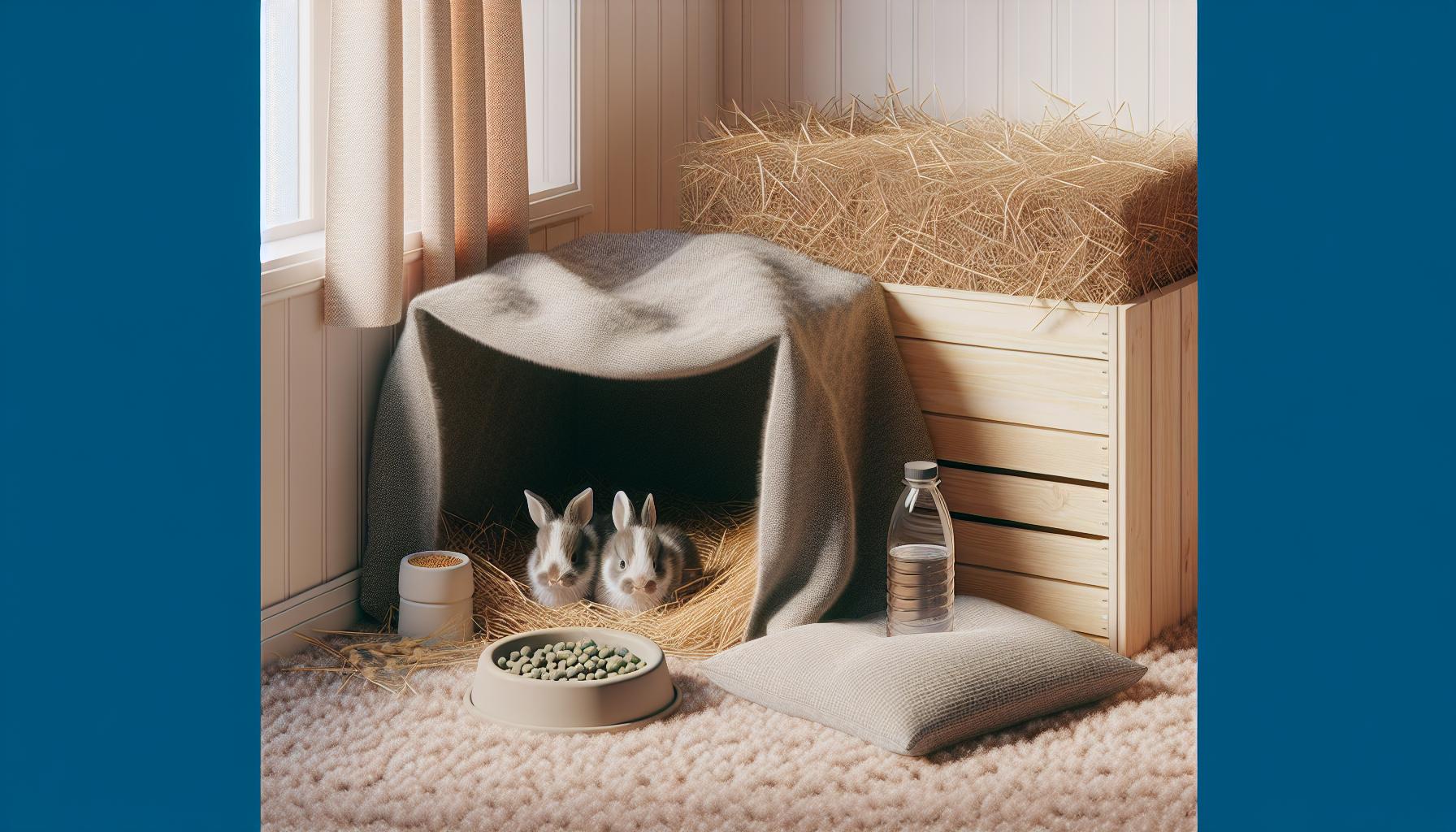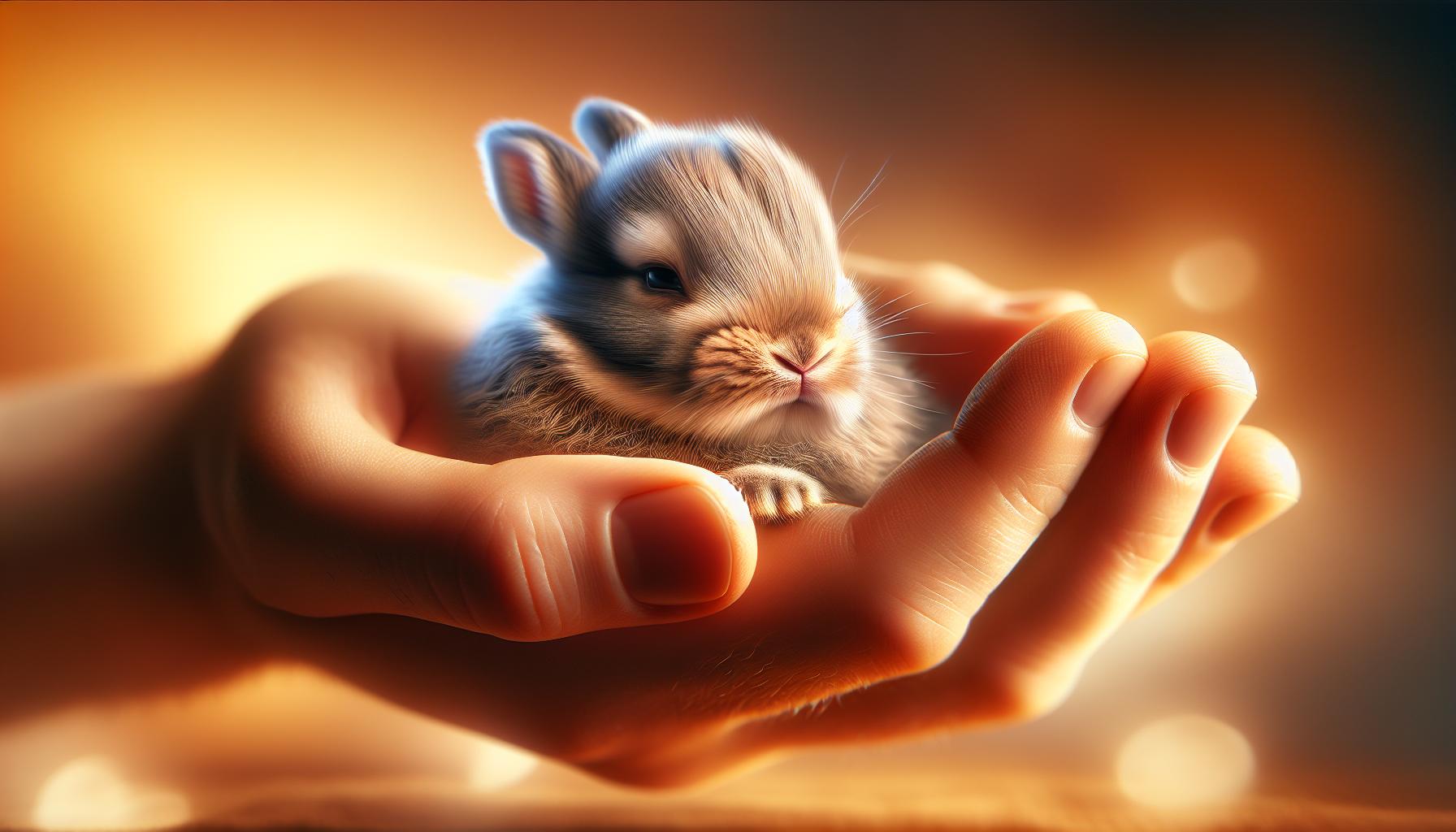Bringing home a newborn bunny can be one of the most rewarding experiences. These tiny, fluffy creatures are not just adorable; they require special care to thrive in their early days. As a passionate bunny lover, I understand the joy and responsibility that comes with raising these delicate little ones.
In this guide, I’ll share essential tips and insights on how to provide the best care for your newborn bunnies. From their nutritional needs to creating a safe environment, every detail counts in ensuring they grow up healthy and happy. Whether you’re a first-time pet owner or an experienced rabbit enthusiast, understanding the basics of newborn bunny care will help you nurture your furry friends effectively.
Key Takeaways
- Understanding Newborn Needs: Newborn bunny care, or kits, are completely dependent on their mother for warmth and nutrition in their early weeks, requiring special care to thrive.
- Importance of a Safe Habitat: Create a warm, clean, and quiet environment that minimizes stress and allows for easy monitoring of the kits’ health.
- Proper Diet is Crucial: Mother’s milk is vital for newborn bunnies’ growth; if unavailable, use a vet-recommended rabbit milk replacer, avoiding cow’s milk.
- Monitor Health Regularly: Keep an eye on signs of dehydration, malnutrition, and other health issues. Regular weigh-ins can help track their growth.
- Gentle Handling Encourages Socialization: Early, gentle interaction is important for developing trusting bonds and reducing fearfulness in newborn bunnies.
- Consult a Veterinarian When Necessary: Seek veterinary care for any signs of distress, weight loss, persistent crying, or unusual behaviors to ensure health and well-being.
Newborn Bunny Care
Newborn bunny care require specific care to ensure their health and well-being during their early days. Understanding their needs and providing proper attention helps them thrive.
Understanding Newborn Bunnies
Newborn bunnies, or kits, are born hairless, blind, and deaf. They rely entirely on their mother for warmth, nutrition, and security during their first few weeks. Kits typically develop an impressive growth rate, tripling in size within a week. By the age of four weeks, they start to explore solid food, transitioning from nursing.
Importance of Proper Care
Proper care of newborn bunnies is vital for their survival and development. Inadequate care can lead to health issues, including dehydration and malnutrition. Providing a warm, safe environment keeps kits comfortable and reduces stress. It’s essential to monitor them for any signs of illness, such as lethargy or poor weight gain. Access to a safe space with soft bedding and minimal disturbances encourages healthy development.
Setting Up the Ideal Habitat

Creating an ideal habitat for newborn bunnies ensures their comfort and security. A suitable environment allows them to thrive and develop into healthy rabbits.
Choosing the Right Space
Selecting a quiet, draft-free area is crucial for newborn bunnies. The space should be away from loud noises and high-traffic zones to minimize stress. Cleanliness is vital, so choose a location that can be easily sanitized. A small, enclosed area helps prevent the kits from wandering off. Ensure the temperature remains between 68°F and 72°F for optimal comfort.
Necessary Supplies and Equipment
Gathering appropriate supplies is essential for caring for newborn bunnies. Here’s a list of necessary items:
- Hiding Box: Provides a safe space for the kits to retreat and stay warm.
- Soft Bedding: Use materials like hay or fleece to offer warmth and comfort.
- Food Dish: Choose a shallow, easy-to-clean dish for introducing solid foods later.
- Water Bottle: Supply a water bottle with a small spout for hydration once they’re ready.
- Heat Source: Utilize a safe heating pad or heat lamp to maintain the ideal temperature, especially in cooler environments.
Properly setting up the habitat ensures that newborn bunnies feel secure and nurtured, setting a solid foundation for their growth and health.
Feeding Your Newborn Bunnies

Feeding newborn bunnies correctly is critical for their growth and health. These fragile creatures thrive on a specific diet during their early days, requiring careful attention to ensure they receive the necessary nutrients.
Recommended Diet for Newborns
Mother’s milk is the ideal and only nutritional source for newborn bunnies during the first four weeks. It’s rich in essential nutrients and provides immunity benefits. If the mother is unavailable, a rabbit milk replacer is an option, specifically formulated for kits. Avoid cow’s milk, as it doesn’t meet their dietary needs and can cause digestive issues. Consult a veterinarian before choosing a milk replacer to confirm its suitability for your kits.
Feeding Schedule and Techniques
Feed newborn kits every 2 to 4 hours, ensuring they consume enough milk to support their rapid growth. Observe their feeding behavior; they should latch onto the mother’s nipple or the bottle with ease. Monitor their weight regularly to assess their progress and adjust feeding frequency as needed. Once the kits reach four weeks of age, gradually introduce hay and specially formulated pellets to their diet, transitioning them to solid food while maintaining access to mother’s milk or a replacer until around eight weeks.
Health and Wellness Considerations

Ensuring the health and wellness of newborn bunnies is crucial for their development. Understanding common health issues and knowing when to consult a veterinarian helps keep them thriving.
Common Health Issues
Newborn bunnies face specific health challenges. Here’s a list of common issues to monitor:
- Dehydration: Kits are at risk for dehydration. Signs include lethargy and sunken eyes.
- Malnutrition: Inadequate nutrition leads to failure to thrive. Check for weight gain during regular feedings.
- Hypothermia: Newborns struggle to regulate body temperature. A warm, draft-free environment is crucial.
- GI Stasis: A slowdown in gut motility can occur. Symptoms include lethargy and lack of interest in food.
- Infections: Bacterial or viral infections can occur. Look for abnormal behavior or discharge from the eyes or nose.
Regular monitoring helps detect these issues early. Prompt intervention significantly improves the chances of recovery.
When to Consult a Veterinarian
Recognizing when to seek veterinary care for newborn bunnies is essential. Consider consulting a veterinarian in these situations:
- Weight Loss: If kits lose weight or show no weight gain, immediate veterinary evaluation is necessary.
- Persistent Crying: Continuous distress signals may indicate health problems. Seek professional help if this occurs.
- Diarrhea: Loose stools can lead to dehydration. Veterinary advice is crucial if this happens.
- Behavioral Changes: Sudden lethargy or lack of response can indicate illness. Consult a vet if behavior changes significantly.
- Physical Symptoms: Signs like difficulty breathing, swelling, or discharge require immediate evaluation by a vet.
Taking these steps ensures newborn bunnies receive the care they deserve, promoting optimal health and wellness.
Socialization and Handling
Socialization and handling are crucial for newborn bunnies’ development. It fosters a trusting bond between the bunny and me, ensuring they become calm and manageable companions.
Importance of Early Interaction
Early interaction encourages confident behavior in newborn bunnies. Positive experiences with me promote social skills and reduce fearfulness. Handling them gently during the first few weeks supports their emotional growth. Engaging in short, calm sessions helps them acclimate to human contact and builds their comfort. As newborn bunnies grow, regular interaction remains vital for maintaining their sociable nature.
- Wash Hands: I always wash my hands before handling newborn bunnies to prevent transmitting germs.
- Support Their Body: I support the entire body while holding them, cradling them gently in my hands.
- Limit Duration: I keep handling sessions brief, ideally only a few minutes at a time, to prevent stress.
- Minimize Noise: I ensure a quiet environment during interactions, avoiding sudden movements or loud sounds.
- Observe Body Language: I pay attention to their body language for signs of distress, like kicking or trying to escape.
- Avoid Overcrowding: I handle one bunny at a time, ensuring they feel secure without overwhelming them.
Implementing these tips creates a positive experience for both me and my newborn bunnies, paving the way for a strong, trusting relationship.
Bunny Care
Caring for newborn bunny care is a journey filled with joy and responsibility. By providing the right environment and nutrition, I can ensure these little ones thrive in their early days. It’s vital to monitor their health closely and recognize any signs of distress or illness.
Establishing a strong bond through gentle handling and socialization will set the foundation for a loving relationship as they grow. With dedication and attention, I can help my newborn bunnies flourish into healthy, happy companions. Embracing this experience will not only benefit the bunnies but also enrich my life as a pet owner.

